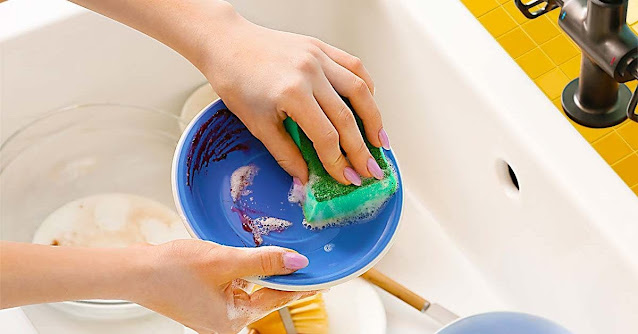Washing dishes is not a simple task as you might think. Indeed, when it is badly done, the dishes remain dirty and stained. More than that, some common mistakes people make while washing dishes can promote the growth of bacteria and germs, or even lead to cross-contamination. Discover these washing mistakes that you should never make.
To ensure good dishwashing hygiene, and to avoid bacteria and germs, it is important to avoid some common mistakes.
What mistakes you're making when washing dishes?
Here are 6 common dishwashing mistakes that should be avoided.
1- Do not remove gunk before washing dishes
Before washing dishes, it is important to throw food gunk and debris into the trash so as not to clog the pipes, but also to avoid the rise of unpleasant odors. Also avoid pouring grease down the sink. Indeed, when it is hot, it flows easily into the siphon, but hardens when it passes through the cold and thus becomes a plug that obstructs the pipe. This is why it is advisable to absorb grease on your dishes with paper towels before washing them. After removing grease and food gunk, remember to soak your plates and dishes in hot water before scrubbing them. This will allow you to clean them more easily. Even if you use a dishwasher, it is recommended that you first rinse dishes and utensils with clear water before putting them in your appliance, in order to remove gunk before they dry out and facilitate so washing.
2- Not cleaning the sink before washing dishes
The kitchen sink is infected with germs that accumulate after washing dishes and plates. This is why before washing dishes, it is important to disinfect the sink. You can use white vinegar or baking soda for this. After you finish washing the dishes, remember to clean your sink and remove standing water to avoid the humid environment that encourages the development of bacteria.
3- Put all dishes in the sink while washing up
Having a full sink hinders the proper cleaning of dishes, but also makes this task complicated. Indeed, if you mix greasy pans or saucepans with other dishes, you risk finding grease on all your dishes. This will make cleaning more tedious. It is best to wash utensils by level of dirt. Start with the least dirty dishes, to finish with the most stained dishes. This way, you will avoid cross-contamination with other dishes. Cross-contamination refers to the transmission of bacteria from one food to another, through hands, utensils or the work surface. Cross-contamination can lead to foodborne infection. Hence the importance of keeping your dishes clean.
4- Overdose on dishwashing liquid
There is a tendency to believe that using a large amount of dishwashing liquid allows for more effective cleaning. However, this belief is false. Indeed, using dishwashing liquid in excess can leave gunk invisible to the naked eye, on your dishes and plates. If you use a dishwasher, it is recommended to add a water softener. Indeed, hard water limestone stains glasses and lids, scales the dishwasher and damages it. Not to mention that it can also lead to overconsumption of energy. To save energy, also remember to check the energy label of a dishwasher before buying it. Choose the one marked A, which means that it is not energy-intensive.
5- Do not change the sponge used to wash dishes
The sponge used to do the dishes is a real breeding ground for bacteria. Indeed, the moisture it contains promotes the development of microbes and bacteria. To avoid infecting your utensils, and therefore your food too, it is important to ensure the proper hygiene of your sponge. To do this, let your sponge dry as soon as you finish washing the dishes. Also remember to disinfect and change it regularly. To eliminate bacteria on your sponge, you can soak it for 5 minutes in white vinegar. You can also, after wringing it out of the vinegar water, put it in the microwave for 60 seconds to disinfect it.
6- Do not dry dishes before putting them away
It is important to dry the utensils and dishes you have cleaned before putting them away. This will allow you to avoid fungus and bad odors that develop due to humidity. Remember to use a clean, dry towel and change it regularly.
By avoiding these mistakes you will ensure good hygiene of your dishes, and effectively eliminate bacteria and germs.


